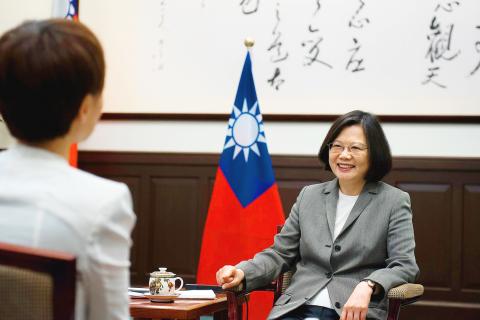Taiwan’s fears that it will become a bargaining chip between China and the US worsened on Friday after a snub by US President Donald Trump, who said he would not do anything to upset Beijing.
Trump rattled China in December last year after taking a congratulatory telephone call from President Tsai Ing-wen (蔡英文) after his election, smashing decades of diplomatic precedent.
However, after Tsai said in an interview with Reuters on Thursday in Taipei that her administration would not exclude the possibility of another telephone call with Trump, the US president said he did not want to risk his newfound “personal relationship” with Chinese President Xi Jinping (習近平).

Photo: EPA / Taiwan Presidential Office
“I think he’s doing an amazing job as a leader and I wouldn’t want to do anything that comes in the way of that. So I would certainly want to speak to him first,” Trump told Reuters in a separate interview.
Ties between Trump and Xi seem to have warmed recently after they met at Trump’s Mar-a-Lago estate in Florida earlier this month.
Since then, Trump has praised China for helping pressure North Korea over its nuclear and missile program.
Citing Tsai’s remarks, Presidential Office spokesman Alex Huang (黃重諺) on Friday said that it was “the president’s passive response to Reuters’ hypothetical questions.”
Tsai’s main point was to “stress that Taiwan and the US should maintain close communication and not rule out any possible form [of communication],” Huang said.
Chinese Nationalist Party (KMT) Legislator Chiang Wan-an (蔣萬安) called Trump’s reaction an “embarrassment” for Taiwan.
“Trump and Xi appear to have established very good relations. Taiwan needs to tread very carefully and be alert,” he told reporters.
The comments were a “serious slap in the face,” Tamkang University political analyst Edward Chen (陳一新) said. “Tsai is throwing the ball into Washington’s court and Washington is saying no.”
However, Democratic Progressive Party lawmaker Chao Tien-lin (趙天麟) said he thought Trump’s response was reasonable.
“Washington needs Beijing in handling the North Korea issue,” he said.
Concerns that Taiwan would become a bargaining chip were raised soon after Trump’s election, when he suggested he might abandon the “one China” policy that underpins US-China relations, unless he could strike better deals with Beijing.
He later went on to say he would honor the policy.
The US is Taiwan’s most powerful ally and arms supplier, despite having no official relations with Taipei after switching diplomatic recognition to Beijing in 1979.

LONG FLIGHT: The jets would be flown by US pilots, with Taiwanese copilots in the two-seat F-16D variant to help familiarize them with the aircraft, the source said The US is expected to fly 10 Lockheed Martin F-16C/D Block 70/72 jets to Taiwan over the coming months to fulfill a long-awaited order of 66 aircraft, a defense official said yesterday. Word that the first batch of the jets would be delivered soon was welcome news to Taiwan, which has become concerned about delays in the delivery of US arms amid rising military tensions with China. Speaking on condition of anonymity, the official said the initial tranche of the nation’s F-16s are rolling off assembly lines in the US and would be flown under their own power to Taiwan by way

CHIP WAR: The new restrictions are expected to cut off China’s access to Taiwan’s technologies, materials and equipment essential to building AI semiconductors Taiwan has blacklisted Huawei Technologies Co (華為) and Semiconductor Manufacturing International Corp (SMIC, 中芯), dealing another major blow to the two companies spearheading China’s efforts to develop cutting-edge artificial intelligence (AI) chip technologies. The Ministry of Economic Affairs’ International Trade Administration has included Huawei, SMIC and several of their subsidiaries in an update of its so-called strategic high-tech commodities entity list, the latest version on its Web site showed on Saturday. It did not publicly announce the change. Other entities on the list include organizations such as the Taliban and al-Qaeda, as well as companies in China, Iran and elsewhere. Local companies need

CRITICISM: It is generally accepted that the Straits Forum is a CCP ‘united front’ platform, and anyone attending should maintain Taiwan’s dignity, the council said The Mainland Affairs Council (MAC) yesterday said it deeply regrets that former president Ma Ying-jeou (馬英九) echoed the Chinese Communist Party’s (CCP) “one China” principle and “united front” tactics by telling the Straits Forum that Taiwanese yearn for both sides of the Taiwan Strait to move toward “peace” and “integration.” The 17th annual Straits Forum yesterday opened in Xiamen, China, and while the Chinese Nationalist Party’s (KMT) local government heads were absent for the first time in 17 years, Ma attended the forum as “former KMT chairperson” and met with Chinese People’s Political Consultative Conference Chairman Wang Huning (王滬寧). Wang

CROSS-STRAIT: The MAC said it barred the Chinese officials from attending an event, because they failed to provide guarantees that Taiwan would be treated with respect The Mainland Affairs Council (MAC) on Friday night defended its decision to bar Chinese officials and tourism representatives from attending a tourism event in Taipei next month, citing the unsafe conditions for Taiwanese in China. The Taipei International Summer Travel Expo, organized by the Taiwan Tourism Exchange Association, is to run from July 18 to 21. China’s Taiwan Affairs Office spokeswoman Zhu Fenglian (朱鳳蓮) on Friday said that representatives from China’s travel industry were excluded from the expo. The Democratic Progressive Party government is obstructing cross-strait tourism exchange in a vain attempt to ignore the mainstream support for peaceful development